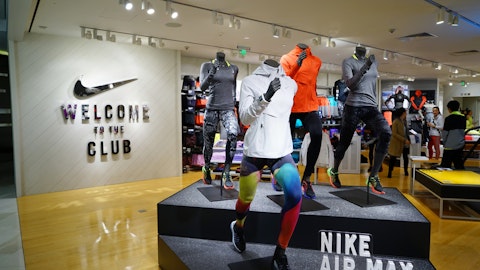Below we present the list of 5 World-Class Shoe Stocks to Buy Now. For our methodology and a more comprehensive list please see 10 World-Class Shoe Stocks to Buy Now.
5. Designer Brands Inc. (NYSE:DBI)
Number of Hedge Fund Shareholders: 30
Designer Brands Inc. (NYSE:DBI) is one of the largest footwear companies in North America, operating some 500 Designer Shoe Warehouse stores as well as the shoe departments in hundreds of other stores. The company also operates e-commerce websites for the U.S. and Canadian markets that include a loyalty rewards program.
Designer Brands Inc. (NYSE:DBI) performed well during the pandemic thanks to its flexible business model, as it shifted to the production of athletic-based footwear to meet the growing demand in the market for workout shoes. It has since shifted back to a heavier focus on fashion-oriented footwear. The company aims to double sales by 2026, with expectations that its The Warehouse Reimagined shop-in-shops concept will contribute 30% of its top-line growth by that time.
Hedge funds have rapidly grown more bullish on Designer Brands Inc. (NYSE:DBI) in recent quarters, as their ownership of the company has more than doubled since the end of September 2020. Lee Ainslie’s Maverick Capital and Michael Gelband’s ExodusPoint Capital were some of the funds to initiate new stakes in DBI during Q2.
4. Crocs, Inc. (NASDAQ:CROX)
Number of Hedge Fund Shareholders: 30
Crocs, Inc. (NASDAQ:CROX) is the developer and distributor of a popular line of casual footwear products and accessories, which are sold in more than 90 countries worldwide.
Crocs has had a rough year on the market, losing 45% in 2022 as investors worry about the various headwinds facing the company while it also works to integrate HEYDUDE following its $2.5 billion acquisition of the casual footwear company. Crocs grew net sales by 14.3% year-over-year in Q2 and anticipates similar growth for 2022 as a whole.
Hedge funds sold off Crocs, Inc. (NASDAQ:CROX) in droves during Q1, as there was a net 32% drop in ownership of the stock, which fell to a two-year low. Ownership remained flat during Q2. Bernard Horn’s Polaris Capital Management and Steven Boyd’s Armistice Capital each sold off large stakes in CROX during the first quarter.
Money manager Choice Equities believes the market is being overly pessimistic on Crocs, Inc. (NASDAQ:CROX) future growth, laying out its thesis on the company in its Q2 2022 investor letter:
“Crocs, Inc. (NASDAQ:CROX) trades at 5x this year’s earnings and 6x EBITDA. Like many of its peers in the consumer space, the valuation implies the market regards the company as a one-time pandemic beneficiary, and business prospects offer little growth beyond this year. While it would be ill-advised to suggest the company did not benefit from the pandemic’s effects on consumer spending on goods, I think this view is incomplete and neglects to incorporate the tremendous success the management team has achieved since they arrived five years ago.
Most recall Croc’s original success as having come from pretty much out of the blue, as the funny-looking but comfortable clogs sent the stock on a meteoric rise shortly after its IPO in 2006. Many also conflate the stock chart with a fad-driven boom and bust cycle, even though a closer look at clog volumes actually shows fairly consistent growth over the last twenty years. Even so, the company was not without its problems, primarily from management missteps as an overburdened cost structure created profit headwinds.
Accordingly, when Andrew Rees became CEO in 2017, he had his work cut out for him. Initially, he focused his efforts on taking costs out and making the operation more efficient. He shrunk the store count by more than a third and began optimizing their go-to market strategy by emphasizing sales through the direct-to-consumer digital channel and through wholesaler channel partners. This enabled the company to devote greater resources to product innovation and marketing, a smart reallocation of corporate resources that offered great payoffs for the branded consumer products company…” (Click here to read the full text)
3. Skechers U.S.A., Inc. (NYSE:SKX)
Number of Hedge Fund Shareholders: 33
Skechers U.S.A., Inc. (NYSE:SKX) sells lifestyle and performance footwear for all ages through hundreds of retail stores across the U.S. and internationally. The company’s brands include various riffs on the Skechers name, including Skechers Sport, Skechers Work, and Skechers Kids.
Skechers had a strong 2021, but growth has slowed considerably this year, which has pushed the stock down by 28% year-to-date. After growing sales by 37% year-over-year to $6.29 billion in 2021, Q2 sales grew by just 12% year-over-year. Direct-to-consumer sales slowed even more, dropping to just 4.3% in Q2 from a 38% clip in 2021. Gross margin also fell by 3 percentage points to 46.7% during the first half of this year, pushing free cash flow down to a five-year low.
There was a slight rebound in hedge fund ownership of Skechers U.S.A., Inc. (NYSE:SKX) during Q2 after a 22% drop during the prior two quarters, which coincided with the stock beginning to slide from its all-time highs. SKX shares have lost 40% of their value since July 2021. Dmitry Balyasny’s Balyasny Asset Management built a new stake of 1.5 million shares of Skechers during Q2.
Fiduciary Management Small Cap Equity dug into Skechers U.S.A., Inc. (NYSE:SKX)’s background and prospects in its Q1 2022 investor letter:
“Skechers is the third largest footwear brand in the world. The company designs, manufactures, and distributes footwear for men, women, and children in U.S. and international markets. Its products cover a wide range of footwear categories including casuals, dress casuals, sandals, boots, work boots, performance footwear, and kids footwear. The company operates in three business segments: Domestic Wholesale (23% of sales), International Wholesale (48% of sales), and Direct-to-Consumer (29% of sales). In total, international sales account for approximately 60% of revenue…” (Click here to see the full text)
2. Deckers Outdoor Corp (NYSE:DECK)
Number of Hedge Fund Shareholders: 36
Deckers Outdoor Corp (NYSE:DECK) owns several brands of footwear, including popular slippers and boots brand UGG, as well as Teva, Hoka, and Sanuk. Deckers also sells apparel, accessories, and handbags. The company has over 100 UGG retail stores, in addition to an e-commerce platform and various wholesale customers.
Deckers Outdoor Corp (NYSE:DECK) was recently added to Wedbush’s Best Ideas List, with analyst Tom Nikic recently upgrading the stock to ‘Outperform’ from ‘Neutral’ and raising his price target on it to $410 from $320. Nikic noted that the company was one of the few within his coverage that raised its earnings guidance this year, and believes the Hoka brand is one of the most compelling growth stories in the footwear space. He’s also bullish on the company’s top-line growth, strong balance sheet, and hefty margins.
There was a 22% drop in hedge fund ownership of Deckers Outdoor Corp (NYSE:DECK) during Q2 and there’s been a 33% decline since ownership of DECK peaked at the end of Q3 2020. Robert Pitts’ Steadfast Capital Management has the largest stake in Deckers Outdoor among the funds tracked by Insider Monkey, owning 1.27 million shares.
1. NIKE, Inc. (NYSE:NKE)
Number of Hedge Fund Shareholders: 73
Topping the list of shoe stocks to buy now is NIKE, Inc. (NYSE:NKE), one of the most recognizable footwear and apparel brands in the world. Nike also sells sports equipment and accessories, including golf clubs, baseball bats and gloves, and watches.
Nike is in the midst of transitioning away from retail outlets to online sales, with great success, as digital revenue topped $10 billion in FY22. Nike topped fiscal 2023 Q1 revenue estimates with $12.7 billion in sales, but investors have become worried about the company’s growing inventory backlog ahead of what’s expected to be a challenging period for consumer discretionary stocks. Nike’s falling margins have also raised concern, with management expecting FY23 Q2 gross margins to slide by 3.5 to 4 percentage points year-over-year.
Hedge fund ownership of NIKE, Inc. (NYSE:NKE) ticked up during Q2 as money managers looked to buy into the iconic brand at a discount. Nike shares fell by 38% during the first half of 2022. Jim Simons’ quant fund Renaissance Technologies initiated a large position in NKE during Q2, buying 2.08 million shares.
Madison Funds is bullish on NIKE, Inc. (NYSE:NKE)’s future growth, laying out some of the reasons why in its Q2 2022 investor letter:
“NIKE, Inc. (NYSE:NKE) is the largest seller of athletic footwear and apparel in the world. Started from humble beginnings as Phil Knight’s “crazy idea” in a Stanford entrepreneurship class, Nike marked its 50th anniversary this year. By remaining true to its innovative culture, the brand is as strong as ever and continues to generate attractive growth, soon to surpass $50 billion in annual revenue. In addition to the continuous investments in brand innovation and marketing, over the last few years Nike has invested heavily to lay the foundation for multi-channel commerce. Today, Nike generates approximately 40% of its revenues through its online channel and branded storefronts. Empowered by CEO John Donahoe’s “Nike Consumer Direct Offense,” Nike’s ongoing investments are expected to further drive their overall revenue mix towards the direct-to-consumer channel which we estimate will result in substantial margin improvement over the next three to five years.
While Nike’s business in China, which accounts for approximately 20% of revenue, is experiencing challenges today, our due diligence suggests that consumer preference for the Nike brand outside the U.S. remains incredibly strong. Overall, we expect Nike’s broader ecosystem, often referred to as the Nike Marketplace, to continue to leverage the company’s innovation and premier brand to build direct consumer relationships which deepen Nike’s competitive moat and enhance its financial profile. Turbulence in the Chinese market and concerns over consumer spending in the US and Europe enabled us to initiate a position in Nike at an attractive discount to our appraisal of the company’s long-term value.”
For more of the latest stock picks worth considering for your portfolio, check out the 10 Best Telecom Stocks To Buy Now and the Best Medical Technology Stocks To Buy.
Disclosure: None.





